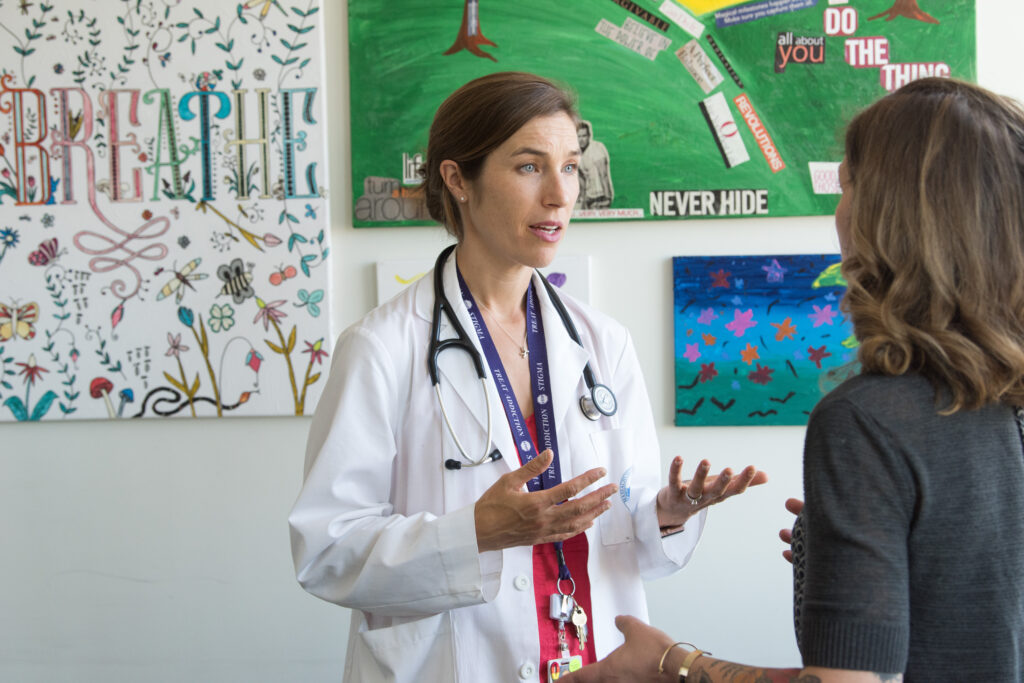In a room full of positivity, more than 50 people recently pedaled their spinning cycles, raising awareness and funding for the Depression Clinical and Research Program (DCRP) at Massachusetts General Hospital.
Developing new treatments that don’t involve medications is important because they can treat depression in different ways that some patients find more tolerable.
“My reaction was that I wanted to raise more awareness about depression immediately,” Mrs. Tulman says of her father’s suicide.
The cyclists came together in October 2018, under the leadership of Wendy Tulman, her husband, Justin, and her daughter, Rebecca, of Natick, Massachusetts, a family that channels their energy into fundraising for depression treatment and research.
When Wendy Tulman’s father committed suicide in 1999, she and her family were stunned. Mrs. Tulman, along with her sister, husband and mother, felt in the dark about depression, and she set out to learn about it. “My reaction was that I wanted to raise more awareness about depression immediately,” she says.
When deciding how to support treatment, she did her homework and found that Mass General’s DCRP was one of the world’s leading research, clinical and teaching centers for depression. Its team of clinicians treats thousands of patients, and researchers conduct groundbreaking studies in neuroscience, genetics, and the assessment of treatments for mental health disorders.
Turning Tragedy into Awareness
Wendy’s father, Roger Goldstein, was a vivacious man who loved golf and who seemed far from depressed. “He’d always light up a room and was a funny, caring, loving guy,” Mrs. Tulman says.
He’d gone to his doctor on a Friday, saying he felt fragile, and was prescribed medication. Less than a week later, he took his own life. “We don’t know what happened over the weekend,” Mrs. Tulman says. “My feeling is that he must have been out of sorts, and there was a powerful chemical imbalance.”
For several years, Mrs. Tulman teamed up with Stacy Sweeney, another woman impacted by suicide to raise funds for the Mass General Department of Psychiatry. Together, the women co-chaired a gala art auction featuring works by local, national and international artists. The dinner and auction drew hundreds of guests, and raised more than $100,000 to support psychiatric research, clinical initiatives, and professional and public education.
“Anti-depressants only work for half the people who take them; and then there’s the issue of side effects.”
After taking a fundraising hiatus to raise her children, Mrs. Tulman is happy to be supporting Mass General again. The charity ride drew more than 50 spinners to the B/Spoke studio in Wellesley, which donated the use of its studio and the spin instructor. So many people wanted to participate, there was a wait list.
David Mischoulon, MD, PhD, director of the DCRP, and Maren Nyer, PhD, director of Yoga Studies at the DCRP, spoke about how the funds Mrs. Tulman helped raise will support a variety of initiatives, including research into the prevention of suicide and treatment of depression.
The Limitation of Current Treatments
In addition to treating patients, the DCRP’s researchers have as many as 15 research projects going on at a time.
“Anti-depressants only work for half the people who take them; and then there’s the issue of side effects,” says Dr. Mischoulon. Developing new treatments that don’t involve medications is important because they can treat depression in different ways that some patients find more tolerable.
For example, researchers are studying different psychotherapies in certain populations, like cognitive behavioral therapy for people with traumatic brain injuries and depression. Another study is seeking new tools to understand the biological changes that occur in this condition. Other studies are underway on acupuncture and natural treatments, including omega-3 fatty acids, vitamins, and probiotics.
“Philanthropy allows us to pursue higher-risk projects we couldn’t get funding for through conventional channels,” Dr. Mischoulon says.
Battling the Stigma of Depression
At the charity ride, participants openly discussed their own and their loved ones’ mental health struggles, all through an upbeat, positive lens. Even the instructor took a moment to share her connection to depression.
At a fundraiser, “depression can be talked about with smiles. People walk away with their heads held high.”
After Mrs. Tulman was diagnosed with depression six years ago, she realized how far mental health treatment has come since her father’s diagnosis. “When I was diagnosed it was very different,” she says. “My doctor made me promise to make an appointment in a week to see a psychiatrist. It’s no longer just give someone a prescription and hope they feel better.”
Mrs. Tulman also sees progress in eroding the stigma associated with depression. “My father’s friends assumed he had money problems or an affair. But now you can feel confident in sharing your story and not thinking people will judge you.”
It’s important to Mrs. Tulman that her fundraisers aren’t gloomy affairs. “Depression can be talked about with smiles,” she says, “People walk away with their heads held high.”
For more information about the Depression Clinical and Research Program, or to make a donation, please contact us.



